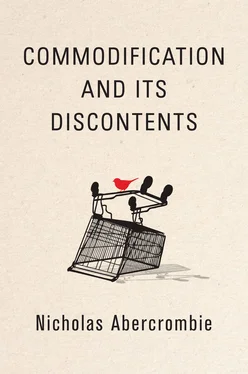This yellow slave
Will knit and break religions, bless the accursed;
Make the hoar leprosy adored, place thieves
And give them title, knee and approbation
With senators on the bench.
In some ways it is perverse to pick out individual plays in Shakespeare since all of them use metaphors involving money. Coins, for example, are omnipresent. As one commentator notes: ‘The way coinage was treated in early modern England created an assemblage of variously useful shorthand symbols and similes, providing a way of concisely expressing aspects of the human condition’ (Cook, 2012: 71). Timon of Athens was probably written in the early years of the seventeenth century. Almost a century earlier, Thomas More had published his Utopia. With a characteristic combination of certainty and violence of expression, he pronounces on the evils of money which would be remedied by its abolition: ‘For who can fail to see that fraud, theft, pillaging, disputes, riots, strife, rebellion, murder, treason, poisoning … would die out with the abolition of money. And at the very moment when money vanished, so too would fear, anxiety, grief, stress and wakeful nights’ (More, 2012: 120, 121).
The eighteenth-century Adam Smith is often thought of as the godfather of the doctrine of unregulated markets. He, however, also identified the vice of money as riches: ‘With the greater part of rich people, the chief enjoyment of riches consists in the parade of riches, which, in their eye, is never so complete as when they appear to possess those decisive marks of opulence which nobody can possess but themselves’ (Smith, 1999: 277). At much the same time as the publication of The Wealth of Nations , the English Romantic movement was stressing, not so much the perils of riches, as the corruption of fundamental human values that money engenders. Shelley (1929: Queen Mab , section V, lines 44–5), for example, notes:
Commerce! beneath whose poison-breathing shade
No solitary virtue dares to spring
while, more famously, Wordsworth (1936: sonnet XXXIII) asserts:
The world is too much with us; late and soon,
Getting and spending, we lay waste our powers:
Little we see in Nature that is ours;
We have given our hearts away, a sordid boon!
In Marx’s earlier work, the idea that money corrupts value is especially prominent. In The Economic and Philosophic Manuscripts of 1844 , in the midst of his discussion of Timon of Athens , he says: ‘If money is the bond binding me to human life, binding society to me, connecting me with nature and man, is not money the bond of all bonds ? Can it not dissolve and bind all ties? Is it not, therefore, also the universal agent of separation ?’ (Marx, 1964: 167, emphasis in original). And, at much the same time, Charles Dickens was writing his novels, in almost all of which the vices of money take a prominent place. He has Arthur Clennam in Little Dorrit declare: ‘I have seen so little happiness come of money; it has brought within my knowledge so little peace to this house, or to anyone belonging to it’ (Dickens, 1953: 49). Summarizing, the critic Humphrey House notes: ‘Money is the main theme of nearly every book that Dickens wrote: getting, keeping, spending, owing, bequeathing, provide the intricacies of his plots; character after character is constructed round an attitude to money’ (House, 1942: 58; see also Miller, 1967; Trilling, 1967).
Despite its continuity and longevity, however, Money Talk does not, over its long history, make the same claims. It is used, typically to attach blame, condemnation and disgust. At the same time, money, it seems, can perform almost any function and encourage any sin. According to writers over many centuries, money promotes, among other things: greed, miserliness, display, contempt for the poor, the defilement of honour and a good name, perversion of the sacred, the destruction of more important human virtues, calculation and measurement, a worship of the transitory and unreal, the obliteration of uniqueness, a tendency to abstraction, the erosion of authenticity, a false standard of excellence, the diminution of the quality of personal relationships and the encouragement of debt and corruption in public life.
These qualities of Money Talk – its diversity and its moral and rhetorical force – indicate that it is a portmanteau expression. Money comes to stand for, or index, a whole variety of other matters that are not necessarily connected with each other or, indeed, with money. Money Talk then becomes a general way of expressing discontent with, or outright opposition to, current social arrangements. The diversities of meaning do not indicate intellectual carelessness. Rather, they give to Money Talk a flexibility that enables it to adapt to changing circumstances. Furthermore, Money Talk is rooted in the mundane. As I have already noted above, it is part of everyday conversation, a set of basic assumptions which are often unconsciously made. In addition, it refers to an entity – money – that is in some respects mysterious and hidden. Dickens captures the point somewhat lyrically:
The mysterious paper currency which circulates in London when the wind blows gyrated here and there and everywhere. Whence can it come, whither can it go? It hangs on every bush, flutters in every tree, is caught flying by the electric wires, haunts every enclosure, drinks at every pump, cowers at every grating, shudders upon every plot of grass, seeks rest in vain behind the legions of iron rails. (quoted in Miller, 1967: 170)
In short, Money Talk is ideological .
Ideologies are rarely subtle and Money Talk is no exception. Typically, it is strident, simple, evangelical even. It does not admit of shades of gey, but only black and white. Money Talk does not inhabit a complex moral universe. It sees itself as part of a struggle with a world corrupted by money. This Manichaean quality is, in turn, a feature of another and crucial characteristic. Money Talk is usually oppositional . It constructs an enemy .
Money Talk may be contrasted with another ideology that I shall call Coined Liberty. The phrase comes from Fyodor Dostoevsky’s The House of the Dead , in which the possession of money is explicitly associated with the small degree of freedom that can be bought in prison, for ‘money can always and everywhere be spent, and, moreover, forbidden fruit is sweetest of all’ (Dostoevsky, 2004: 13). (Dostoevsky, however, does not appear to endorse this viewpoint in his other novels. Indeed, in these, his more sympathetic characters seem rather to be promoters of Money Talk.) The main principle of Coined Liberty is freedom, freedom of the individual subject, that is. But its main expression, in modern times at least, is the free market and the conditions that promote it. That freedom is held both to underpin and also to flow from individual liberty. In addition, free markets are claimed to be dynamic and fostering of innovation, increasing prosperity which finds its way to all members of society. Like Money Talk, Coined Liberty has a long history and has generated an enormous literature.
Coined Liberty makes moral claims. It is about the virtues of markets or, more precisely, free, unregulated markets. The virtues of liberty are as important to Coined Liberty as justice or personhood are to Money Talk. At the same time, Coined Liberty sees itself as oppositional. In the earlier phases of capitalist society, writers promoted the virtues of money because its possession and use gave people liberty from traditional constraints and feudal hierarchy. Raymond Southall, in his Literature and the Rise of Capitalism (1973), for example, argues that literature, especially poetry, in sixteenth-century England, in its apparently positive use of imagery of gold and jewels, demonstrated an initial enthusiasm for an emergent capitalist society and for the institutions, including markets and money, that the new society brought. As Southall goes on to note, it is true, however, that the enthusiasm became somewhat dimmed in the subsequent century. A similar sense of opposition appears in the version of Coined Liberty, neoliberalism, that was born before the Second World War and rose to prominence in the 1970s, chiefly in the Anglo-Saxon world. As Friedrich Hayek, so often employed as the originator of neoliberalism, wrote in 1944 of the connection between money and freedom: ‘money is one of the greatest instruments of freedom ever invented by man. It is money which in existing society opens an astounding range of choice to the poor man’ (Hayek, 2001: 93). And many social movements opposing the dominant moral culture of contemporary society will see commercial activity as a route to their freedom from moral repression (Austin, 2005; Rushbrook, 2005).
Читать дальше












